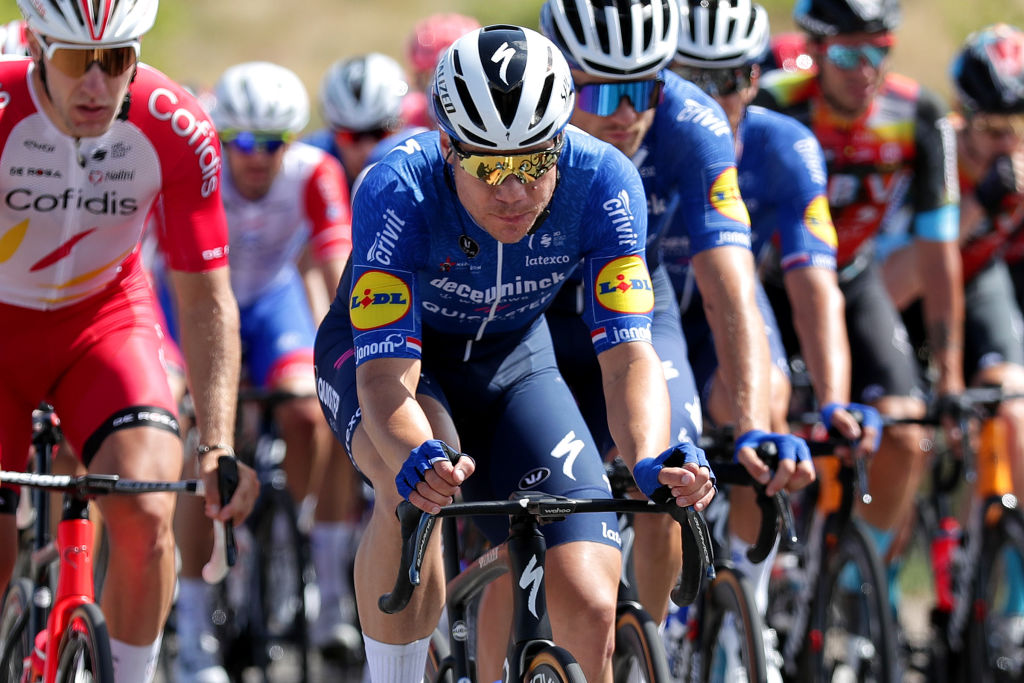Sénéchal: Fabio Jakobsen always said he would come back stronger after his crash
Frenchman highlights teammate’s resolve following Vuelta a España win

Florian Sénéchal was the first man on the scene on that harrowing afternoon in Katowice a year ago, and it was only fitting that he was one of the first to congratulate Fabio Jakobsen after his victory on stage 4 of the Vuelta a España in Molina de Aragón.
When Sénéchal came to the aid of his Deceuninck-QuickStep teammate after his horrific crash in Poland, he found himself alerting medics to save his life. He could never have imagined that, within a year, he would be back to helping his friend win bike races again.
Indeed, as Jakobsen negotiated the various doleful stations of his rehabilitation, returning to his former eminence as a sprinter must at times have seemed a doomed endeavour. As recently as the Critérium du Dauphiné in June, the pain in Jakobsen’s mouth – he required 10 new teeth – left him lying awake and groaning in his hotel room at night, as Sénéchal told reporters past the finish line on Tuesday afternoon.
“It’s crazy. For Fabio, it’s a nice moment, I’m happy for him,” Sénéchal said. “I was there when he crashed in Poland and I was in his house in the Netherlands, and I know it was not easy for him or his family. But now after one year, he’s come back. He’s come back stronger. He’s strong physically but he’s also strong in the head. Some people wouldn’t have come back from this accident.”
The first, fretful hours after Jakobsen’s crash were reported in detail and so too were the first, arduous weeks of his rehabilitation, as he transferred from an intensive care unit in Sosnowiec, Poland to the Leiden University Medical Center in his native Netherlands. “You can safely speak of a miracle,” Deceuninck-QuickStep doctor Yvan Vanmol said then, but Jakobsen’s eventual comeback was the fruit of the quiet months of labour that followed.
After every stride forward, like his first bike ride or his attendance at a team training camp, he seemed to be pushed backwards by another round of surgery. Somehow, his morale never seemed to drop, at least in front of his teammates.
“He never lost his mentality, it was always a good atmosphere, always,” said Sénéchal. “He never said, ‘I’m shit, it’s no good for me.’ It was always, ‘I can come back. OK, I’m training easy now, but for sure I’ll come back and I’ll come back stronger.’
Get The Leadout Newsletter
The latest race content, interviews, features, reviews and expert buying guides, direct to your inbox!
“He came back step-by-step. Sometimes, he trained a lot and then he had to stop because he had another operation. I think he stopped four different times for two weeks in the winter for operations. I shared a room with him one time and he had pain in his jaw. He lost a lot of blood this year in the Dauphiné. It was a bad experience for him but also a good experience for his cycling. When you have the mentality, you can do anything.”
Sénéchal was also by Jakobsen’s side at the Tour de Wallonie last month, when he returned to winning ways by notching up a brace of stage victories. Those were the first sprints he had contested with intent since he began his competitive comeback at the Tour of Turkey in April, and the experience augured well for the Vuelta.
After Jakobsen took second on Sunday’s fraught finale in Burgos, his team realised victory was within his reach at Molina de Aragón. “I just said, ‘Stay calm: you have the legs and you have a team',” Sénéchal said of his advice ahead of the finale.
After descending from the podium, meanwhile, Jakobsen declared that victory here had marked the end of his comeback. Now the beat goes on. He is a sprinter again, and he wouldn’t have it any other way.
“Today he spoke with the legs. It’s good for confidence,” Sénéchal said, before turning his mind to Wednesday's flat run to Albacete. “It’s also good for tomorrow and the next part of the Vuelta.”

Barry Ryan was Head of Features at Cyclingnews. He has covered professional cycling since 2010, reporting from the Tour de France, Giro d’Italia and events from Argentina to Japan. His writing has appeared in The Independent, Procycling and Cycling Plus. He is the author of The Ascent: Sean Kelly, Stephen Roche and the Rise of Irish Cycling’s Golden Generation, published by Gill Books.